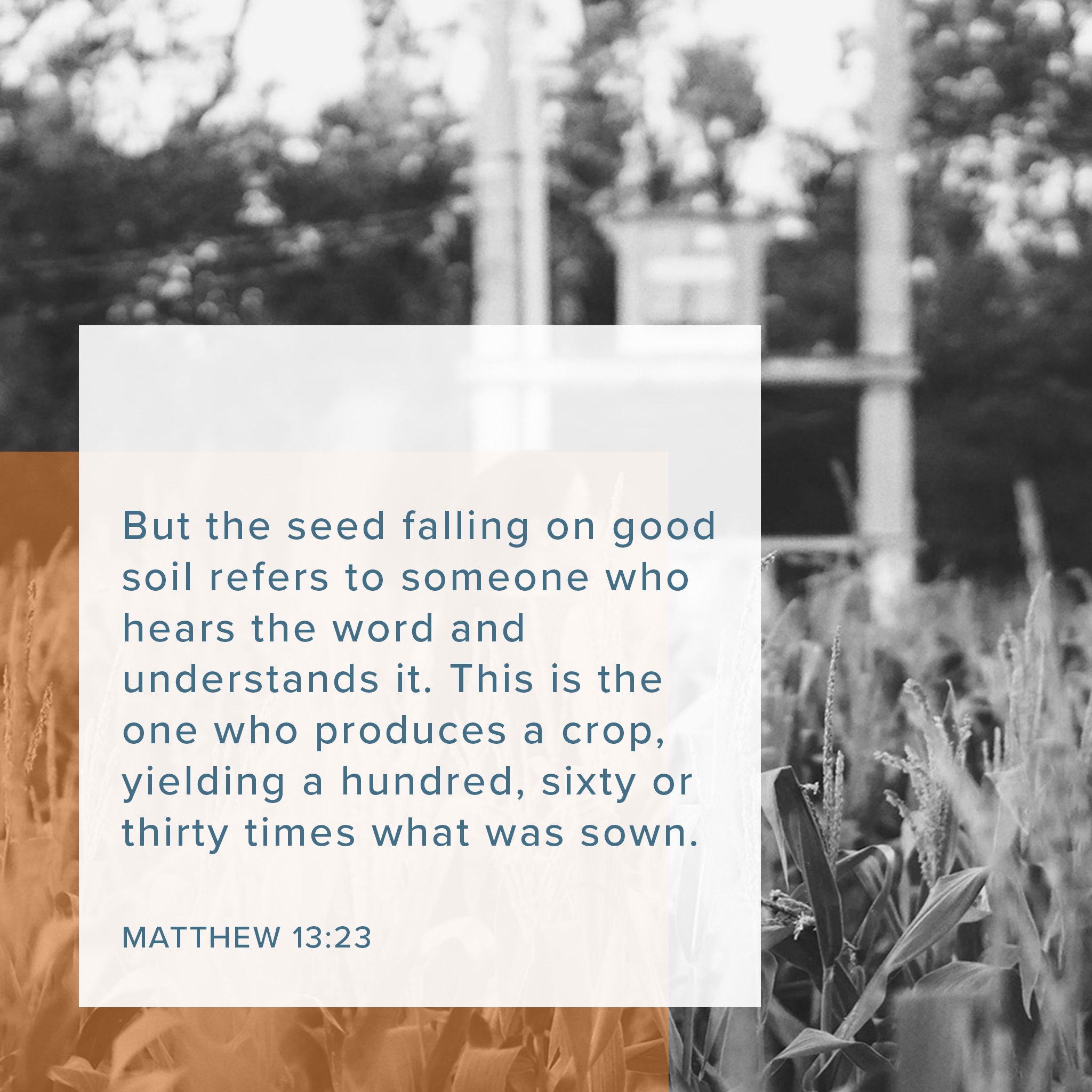July 26, 2020
Pastor Gunnar Ledermann
13 That same day Jesus went out of the house and sat by the lake. 2 Such large crowds gathered around him that he got into a boat and sat in it, while all the people stood on the shore. 3 Then he told them many things in parables, saying: “A farmer went out to sow his seed. 4 As he was scattering the seed, some fell along the path, and the birds came and ate it up. 5 Some fell on rocky places, where it did not have much soil. It sprang up quickly, because the soil was shallow. 6 But when the sun came up, the plants were scorched, and they withered because they had no root. 7 Other seed fell among thorns, which grew up and choked the plants. 8 Still other seed fell on good soil, where it produced a crop—a hundred, sixty or thirty times what was sown. 9 Whoever has ears, let them hear.”
18 “Listen then to what the parable of the sower means: 19 When anyone hears the message about the kingdom and does not understand it, the evil one comes and snatches away what was sown in their heart. This is the seed sown along the path. 20 The seed falling on rocky ground refers to someone who hears the word and at once receives it with joy. 21 But since they have no root, they last only a short time. When trouble or persecution comes because of the word, they quickly fall away. 22 The seed falling among the thorns refers to someone who hears the word, but the worries of this life and the deceitfulness of wealth choke the word, making it unfruitful. 23 But the seed falling on good soil refers to someone who hears the word and understands it. This is the one who produces a crop, yielding a hundred, sixty or thirty times what was sown.”
Matthew 13:1-9, 18-23
“Push the ‘home’ button. It’s the round button on the screen. No, not on the side of the phone, on the front where the blank screen is. Ok, now, put in your code. Yes, you did create a code. Did you write it down? Good, go get it out of the drawer, so that we can use it to open your phone. Yes, I know it is one more thing to remember just to open your phone, but that is just the way the phones are these days. Ok, now we are in and you can click on whatever app you want to use. Well, you might want to use the calculator, or click the phone to call me or click the message to send me a text message. No, text messages and email are not the same, but there is an email app. Yes, you will need your email and password if you want to set up the email app on your phone. Ok, click the message app. Now, click the little picture of a pencil and notepad. Yes, I know it is small, but just click there. Now, type in my name, click my name and you can send me a message. Ok, now shut the phone off and let’s try again. What button do you push? No, remember it’s on the front of the phone. Ok, now put in your code. No, remember it’s your four-digit code not your email. Ok, let’s stop because you’re not listening to me.” Perhaps you’ve had or witnessed a conversation like this when someone who knows how to use a smart phone is trying to explain it to someone who does not understand how to use a smart phone. In life, we talk a lot and hear a lot of words, but we do not always understand.
Words serve a purpose. Words are meant to be heard, but not just heard, understood. You and I carefully or sometimes not so carefully craft our words with correct grammar, the right language and dialect, proper accents, emotion and body language, all so that the message we are sharing with our words is understood. Words serve a purpose as does rain and snow. God sends water on the earth in the form of rain or snow to make plants grow, provide seeds for the next harvest and give food for eating. Words and water serve a purpose, and both are used by God to give life as recorded in Isaiah 55, 10 As the rain and the snow come down from heaven, and do not return to it without watering the earth and making it bud and flourish, so that it yields seed for the sower and bread for the eater, 11 so is my word that goes out from my mouth: It will not return to me empty, but will accomplish what I desire and achieve the purpose for which I sent it.” God has a purpose for the water he sends on the earth to give life, but a far greater purpose for the Word he sent into the world to give eternal life.
Jesus used his words to teach the people about the kingdom of heaven. The kingdom of heaven is God’s ruling in our hearts. You can also then think of the kingdom of God as the “Church” meaning all believers in Jesus as their Savior. It is what Jesus told us to pray for in the Lord’s prayer, when he said in Matthew 6, 10 “Your kingdom come.” Jesus often taught about the kingdom of heaven using parables, which are stories or illustrations relating to an everyday activity that teach something about God’s kingdom. In Matthew 13, Jesus told a parable about a farmer who went out to sow his seed, and 4 “As he was scattering the seed, some fell along the path, and the birds came and ate it up. 5 Some fell on rocky places, where it did not have much soil. It sprang up quickly, because the soil was shallow. 6 But when the sun came up, the plants were scorched, and they withered because they had no root. 7 Other seed fell among thorns, which grew up and choked the plants. 8 Still other seed fell on good soil, where it produced a crop—a hundred, sixty or thirty times what was sown.” In this parable, the seed is the Word of God, the Bible or the gospel, which is the message that we are sinners who face death and hell, but are saved because Jesus came to live a perfect life, die in our place and take the punishment of our sin giving us his perfect record keeping us from suffering in hell, who also rose from the dead guaranteeing our resurrection to eternal life in heaven. The sower is Jesus or anyone who shares the Word of God. Jesus purpose in sharing this parable was for both believers and unbelievers. Those who heard the parable and understood, are those who believe in Jesus and go on to produce a crop. While, those who heard and did not understand, are those who reject Jesus and are lost to the things of this world, which all result in death.

Those who hope in Jesus for life understand Jesus’ parable. Those who are the good soil are those in whom God has planted the Holy Spirit. The Holy Spirit is the one who allows us to hope in Jesus for forgiveness and eternal life. He also opens our ears to hear warnings in Jesus’ parable for the ways the world can steal our hope. Paul in Romans 8 summed up what we face as we wait for heaven to be ours in this broken world of sin, death and unbelief, 22 “We know that the whole creation has been groaning as in the pains of childbirth right up to the present time. 23 Not only so, but we ourselves, who have the firstfruits of the Spirit, groan inwardly as we wait eagerly for our adoption to sonship, the redemption of our bodies. 24 For in this hope we were saved. But hope that is seen is no hope at all. Who hopes for what they already have? 25 But if we hope for what we do not yet have, we wait for it patiently.” Paul reminds us that the whole creation was affected by sin, and along with it we are waiting to be taken out of this world to live with God in heaven. This is why we have hope, we are hoping in the future where we will have perfect bodies in heaven free from sickness, weakness, pain, sin and death. It is a wonderful future, but it is not ours yet. It is a future worth waiting patiently for, but it is a hard wait. God knows it is hard to keep our hope in heaven, which is why he sends us the Holy Spirit to keep our faith strong against losing hope. And, the Holy Spirit keeps our faith strong through hearing the Word of God.
Jesus gave us what we need to keep our ears open to hear and our hearts able to understand when he said, 9 “Whoever has ears, let them hear.” Hearing the Word of God defends us against what robbed the other soils of the seed and hope in it. For times when we allow ourselves to quickly glance at a daily devotion, say our prayers or sing a hymn without even thinking, take a nap or plan our grocery list during a sermon because we think we really don’t need to pay close attention to something we know so well or have heard so many times before, we can take warning from the seed that fell on the path and was eaten by the birds. Jesus quoted Isaiah 6 here in Matthew 13 warning what can happen even to the God’s people of Israel, 15 “For this people’s heart has become calloused; they hardly hear with their ears, and they have closed their eyes. Otherwise they might see with their eyes, hear with their ears, understand with their hearts and turn, and I would heal them.’” There is no time when you or I will be done hearing the Word of God, instead we need it every day even more than food as we hear in Deuteronomy 8, 3 … “man does not live on bread alone but on every word that comes from the mouth of the Lord.”
We can also learn from the seed that fell on rocky soil, seed that had brief joy, but died in the face of trouble or persecution. If you do not remain in the Word of God so that you are prepared to defend yourself against attacks to your faith, you will not have the joy of Jesus’ victory. Paul in Ephesians 6 encourages us, 10 Finally, be strong in the Lord and in his mighty power… 12 For our struggle is not against flesh and blood, but against the rulers, against the authorities, against the powers of this dark world and against the spiritual forces of evil in the heavenly realms. 13 Therefore put on the full armor of God, so that when the day of evil comes, you may be able to stand your ground… with the belt of truth buckled around your waist, with the breastplate of righteousness in place, 15 and with your feet fitted with the readiness that comes from the gospel of peace. 16 In addition to all this, take up the shield of faith, with which you can extinguish all the flaming arrows of the evil one. 17 Take the helmet of salvation and the sword of the Spirit, which is the word of God.” There is real power in the Word of God to defend yourself, to fight against what threatens your faith and to give you joy in victory.
And, from the seed that fell among thorns and was choked out by worries and wealth, you and I can take an honest look at what we are banking on to keep us alive and what lies at the heart of our greatest fears. The way we learn to be honest with ourselves about what we worry about and what we consider wealth is with the wisdom of God as Solomon wrote in Proverbs 9, 10 “The fear of the Lord is the beginning of wisdom, and knowledge of the Holy One is understanding.” The seeds that fell on soil that was not good did not understand the kingdom of God, and it was a description of those who do not believe by Jesus. However, the seed that fell on good soil describes those chosen by God to believe. It is those Jesus described like this, 16 “But blessed are your eyes because they see, and your ears because they hear. 17 For truly I tell you, many prophets and righteous people longed to see what you see but did not see it, and to hear what you hear but did not hear it.” You are blessed because God opened your eyes to see, your ears to hear and your hearts to believe.
If you do not understand how to use the latest technology, just be patient, it will be old news soon enough. In life, we talk a lot and hear a lot of words, but there is only one message from God. Through his Word, you are able to recognize fake joy, distractions, worries and greed, and turn off, tune out, unfollow and avoid them. Then, you are blessed to listen to what God says about his kingdom, about Jesus, the sower of seed, the sharer of the good news that he has saved you from sin and death, and he has given you forgiveness, love, joy, armor to defend and fight, victory, a clean record, hope and heaven. By the Holy Spirit, you have hope and understanding, which means you are a sower. God has plans to produce a crop through you because you can share with others that understanding God’s kingdom means listening to the Sower. Amen.



